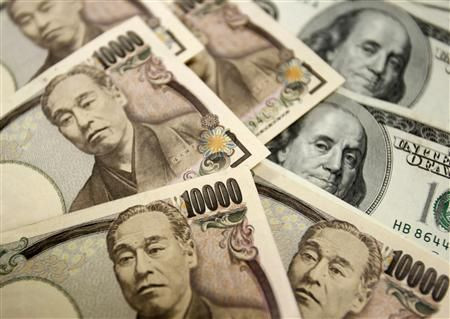Japan Mulling FX Intervention

Japanese authorities know there is not much they can do to turn a broad weak-dollar tide so will judge any intervention a success if it keeps speculative action from driving up the yen too far and too fast.
That is why they may consider a repeat of the solo intervention last September, which they believe helped stem excessive yen rises driven by factors beyond Japan's control.
But Tokyo's goal will be not just preventing rapid moves. While no one will say so publicly, currency levels -- not just the pace of falls -- also matter because of the impact they have on corporate sentiment and investment decisions.
That means a grinding slide in the dollar below the record low of 76.25 yen, hit after the March 11 earthquake, may be enough to spur the authorities into action.
Stock prices matter too. To the relief of authorities, unlike in the past, the market is holding up well despite the yen's gains that tend to hurt exporters, with the Nikkei average staying above 10,000.
"Authorities are watching out for any market moves that could hurt sentiment. Damage to business confidence may come from yen rises or stock price falls - or both," said a source familiar with government's exchange rate policy who spoke on condition of anonymity.
Markets virtually rule out a repeat of the co-ordinated intervention that the Group of Seven carried out in the aftermath of the devastating earthquake in March.
Japanese policymakers, alarmed at the yen's persistent rise, instead see solo action as an increasingly viable option, although markets are skeptical of how much lasting effect any such move would have on the yen.
"Any intervention will likely prove ineffective because current yen rates are determined by external factors such as Europe's sovereign problems," said Satoru Ogasawara, economist at Credit Suisse in Tokyo.
"Tokyo will also have a hard time getting consent from Washington because the Nikkei's strength suggests that the yen strength is not serious enough to delay Japan's recovery."
SENTIMENT MATTERS
The dollar hit another four-month low below 77.70 yen on Wednesday despite repeated verbal warnings to markets by Japanese policymakers about pushing up the yen too much.
It is nearing levels hit before the G7 intervention in March, and nearly five yen lower than the 82.59 yen on which big manufacturers have based their earnings forecasts for the current fiscal year, according to the BOJ's tankan survey.
Japanese policymakers do not hide their discomfort over the fact the yen is sought as a "safe haven" when the country itself is struggling to recover from the post-quake slump.
Just like last September, the yen is driven by developments in the United States and Europe. Back then, it was anticipated further aggressive Fed easing and Euro Zone's debt woes. This time it is a stand-off in Washington over raising the U.S. debt limit and Europe's debt crisis again.
Tokyo intervened on Sept. 15, shortly after the dollar hit a 15-year low of 82.87 yen, a move that pushed the U.S. currency up by more than 3 percent during the day.
While the dollar rises soon petered out, finance ministry officials judge the intervention as a success as it halted excessive, short-term falls and prevented the U.S. currency from breaching the psychologically important 80 yen level. It took another six months for the dollar to eventually cross that line.
Monetary authorities would seek to achieve a similar effect again, although what complicates the timing of action is the fact that it is uncertain how much the August 2 deadline for raising the U.S. debt ceiling is driving the current dollar weakness.
Finance Minister Yoshihiko Noda has repeatedly warned that Tokyo will take "decisive action" when necessary. That is the strongest warning used to signal Tokyo's readiness to step into the market and was frequently used by the premier and finance minister leading up to last year's intervention.
The immediate priority for the Finance Ministry, in charge of Japan's currency policy, is to prevent speculators from using the U.S. debt crisis as an excuse to bet on yen appreciation and trigger excessive market volatility.
Data on investment flows support concern over such trade. Speculators' net long positions in yen futures in Chicago rose to 42,155 contracts last week.
This is the highest since November and not far from historical peaks around 50,000-60,000 contracts last year, according to the U.S. Commodity Futures Trading Commission.
But keeping speculators at bay is not the only goal in the longer term, as yen rises -- even at a slow pace -- would add to a list of headaches the March quake created for companies operating in Japan, such as fears of prolonged power shortages.
This is a view shared by the Bank of Japan, which is ready to follow up on any currency intervention with further monetary easing if necessary, as early as at its rate review next week.
The hope is that intervention coupled with monetary easing - if timed well - could halt or slow yen rises, as they did to some extent last year.
© Copyright Thomson Reuters 2024. All rights reserved.





















